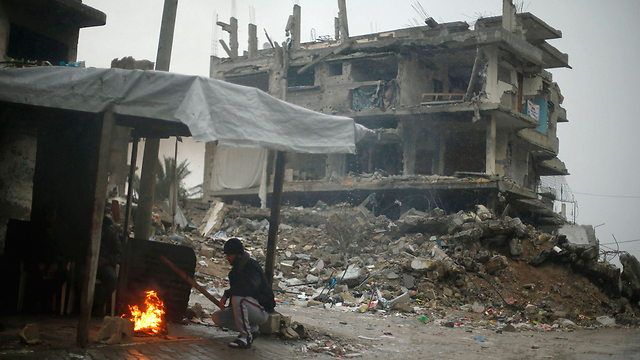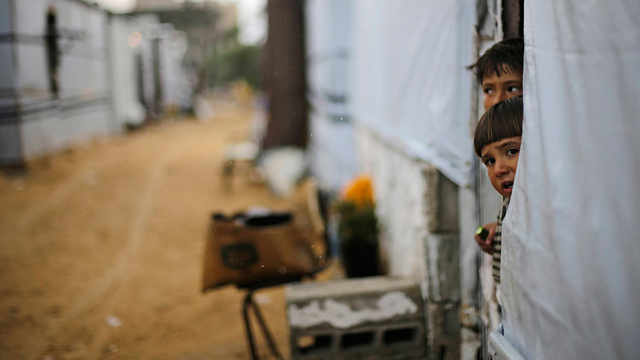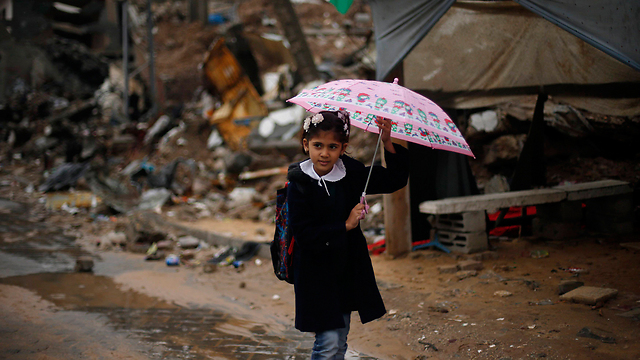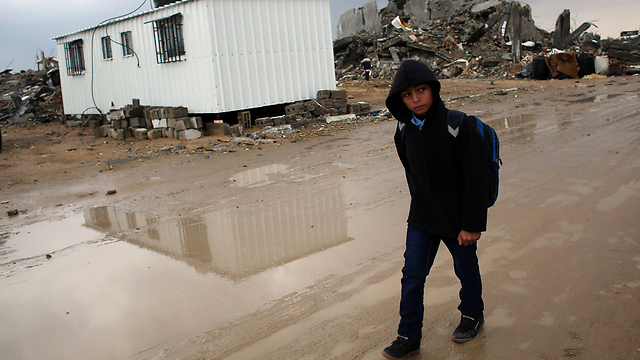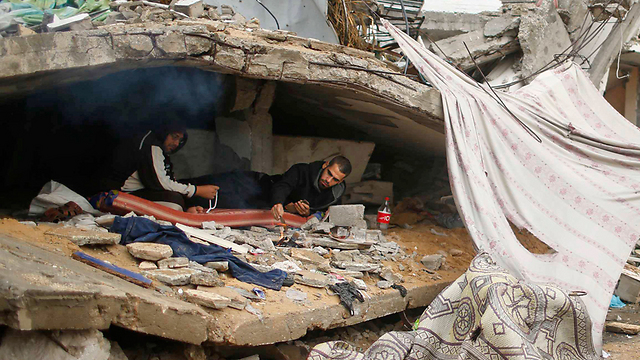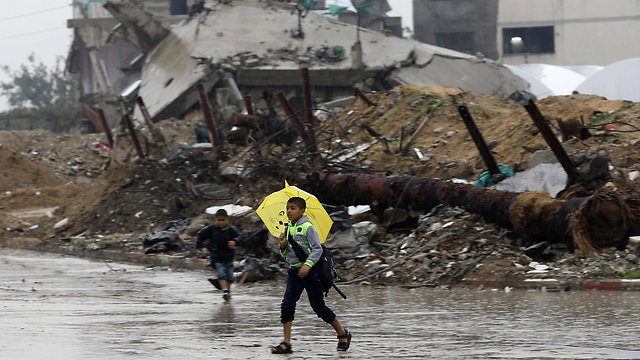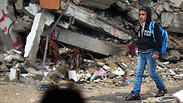
Israel must make Gaza reconstruction a top priority
Op-ed: After countless operations and three major battles, it's time for a different policy which will lead to a long-term, stable truce on southern border.
It's true that Hamas has been deterred, but it is desperate as it is failing to provide a response to the residents' distress. The negotiations on Gaza's reconstruction are stuck. The $5.4 billion the donor states promised the Strip have not arrived. Rainstorms have caused floods and led the United Nations to declare a state of emergency. Hundreds of thousands have been pushed to the brink of a humanitarian crisis, which will only get worse.
Hamas' rule in Gaza is being threatened, and the organization is apparently quickly approaching a situation in which it will favor a violent escalation over a continuation of the current situation – just like in the period before Operation Protective Edge.
The tests Hamas is conducting on the rockets it has begun producing again and the shooting incidents which have already been resumed along the border fence indicate that the lull in southern Israel is more fragile than ever.
The paradox is that Israel is the only party right now which has a chance of creating a change that will lead to a long-term, stable truce on both sides of the border. But first we must acknowledge the fact that when it comes to the Gaza Strip, the "rounds method" has gone bankrupt.
After countless operations and three major battles, the south's residents are rightfully demanding a different policy which will lead to a long-term, stable truce that will last for years. Achieving this goal involves a number of fundamental difficulties.
First, because Hamas and the other big terror organizations in Gaza will not agree to disarm out of their own free will. They will not accept a demilitarization of the Strip and will not agree to effective international supervision which will prevent them from gaining military strength and increasing their weapon production efforts.
But as long as these organizations' military wings are equipped and ready for action, they will use these abilities sooner or later. The armed struggles aimed at wiping Israel off the map is a sacred religious principle for Hamas and similar groups. A secret or open, direct or indirect, dialogue between Hamas and Israel is unlikely to change this basic fact.
A dialogue with Hamas is therefore unhelpful as long as we are unprepared to give in to the organization's demands, like in the Shalit deal, for example. So the argument taking place in Israel on whether we should talk directly to Hamas is theoretical and of academic value at the most.
But even without a dialogue with Hamas, Israel has a strong and long-term interest in a quick restoration of the ruins and in creating a functioning economy in the Strip. Not for the love of Hamas or the Gazans, but out of a sober recognition that destruction and economic and social distress in the Strip will eventually work against us.
The majority of the desperate population in the Strip blames us rather than Hamas for its distress. That is why it takes pleasure-revenge in rocket fire on Tel Aviv.
A relatively improved economic situation, on the other hand, a restoration of the ruins of the recent operation and freedom of movement will calm the people down. Hamas' political leadership in Gaza has proved that it is attentive to the people's needs, and therefore the citizens have the power to restrain Hamas and its military wing.
We have to stop fantasizing that Mahmoud Abbas will gradually take control of the Gaza Strip from Hamas in the near future and lead the Strip's reconstruction. The Palestinian president may want to do so, but is incapable of doing so at the moment. He is postponing and rejecting even the little that the Egyptians, Americans and we are asking him to do – like stationing his people at the crossing and allowing minimum supervision over the passage of people and goods to and from the Strip – using different excuses. And rightfully so, as far as he is concerned.
At the moment, Hamas is not showing any sign of agreeing to an effective distribution of authorities and control over the Strip and its crossing, including the Rafah Crossing, between the Islamic organization and Abbas' government workers and security personnel.
Egypt won't come to the rescue either. After the recent terror attacks in Sinai against Egyptian security forces, President Abdel Fattah al-Sisi is unwilling to lift a finger to help Hamas ease the Gazan population's distress and thereby bolster its rule.
The current regime in Cairo sees Hamas and the other Gazan organizations as a hostile element which actively supports the Egyptian Muslim Brotherhood (which Hamas is an offshoot of) and Ansar Bait al-Maqdis, which is active across Egypt on behalf of the Islamic State. The Egyptians appear to be exaggerating a bit about the extent and severity of the cooperation between Hamas and al-Sisi's enemies, but that doesn’t really matter.
Al-Sisi is shutting off the smuggling runnels under the Philadelphi Route, which were the Gazan economy and terror's source of oxygen, at a record pace. He is even demolishing hundreds of houses in order to create a security buffer zone between Egyptian Rafah and Palestinian Rafah.
Recently, as a way of punishing Hamas, the Egyptians closed the Rafah Border Crossing and decided not to invite the sides to what was supposed to be the second stage of the arrangement following Operation Protective Edge: The negotiations on the reconstruction of the Strip in exchange for demilitarization. We should add to that the fact that Egypt doesn’t have the economic ability to support the Strip's reconstruction.
Civilians are most important driver of pressure
With these conditions, and with no reliable mediation channel which can influence Hamas and lead to a reasonable and stable arrangement, Israel must initiate and activate drivers of pressure on Hamas in order to move it in the desirable direction.
The most important and efficient driver of pressure on Hamas are the uninvolved residents of the Gaza Strip. They can not only press Hamas to avoid firing at Israel and executing terror attacks on Israeli territory, but also force Hamas to act against the rebel organizations. But in order to do that, the Strip's citizens have to have a lot to lose if another war breaks out. A Gazan who has just rebuilt his home which was destroyed in Protective Edge, and who has found a profitable and respectable job, will not hesitate to come out against the fanatic militants.
But for that purpose, Israel must change its paradigm: Favor Gaza's reconstruction and economic rehabilitation over any other consideration, including preventing Hamas from growing stronger.
"Aggressive reconstruction," while taking risks and with international aid, is the only means we haven't taken yet. It's worth a try. The benefit may be big enough to justify the marginal risk, including the immediate construction of a naval port (a temporary port or a floating dock) which would allow the export and import of goods, checking production equipment and machinery in a Cypriot port, easing the passage of people and goods between Gaza and the West Bank, and supplying construction materials in the required pace and under UN supervision of their use.
The second driver of pressure is "aggressive prevention," which is based on two things: Much tighter intelligence surveillance of the terror organizations in the Strip and an immediate military response to any discovery of a significant development.
Regardless of whether the blow is dealt secretly or openly, it must be immediate. The original sin was when we failed to respond immediately to the first rocket fired after the disengagement from Gaza. This may spark an exchange of fire and a rocket barrage, but over time the use of such a consistent preventive power will have a long-term deterring effect.
This policy will of course have to be explained to the southern residents, who will suffer from it the most, and they must be allowed to fortify themselves and prepare. Based on conversations with many of them, I believe they will understand and exercise patience until the preventive blows achieve the desired effect. They know very well where the restraint towards "rocket drizzles" got us.
The preliminary blows initiated by us as part of the preventive aggression as are important as the "aggressive rehabilitation," but both must be launched simultaneously so that the policy will be effective.
Finally, the third driver of pressure can be called "external aiding factors": Egypt, the UN, the American administration, the European Union and even Qatar, which has recently gotten back in line with the moderate Gulf states. These factors can fund the aggressive reconstruction, launch projects which will generate employment and growth and prevent the spillover of materials to unwanted elements and places. They can also exert all types of pressure on Hamas to avoid violence.
If this move, which will be initiated and directed by Israel, will be carried out firmly and extensively, it has a chance not only to bring about a calm on the Gaza front but also to a positive change in the entire Palestinian arena. If you will, it is no dream.










